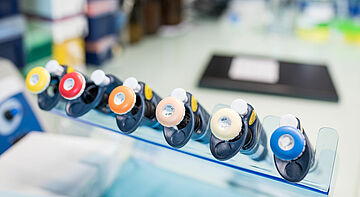By generating brain tissue in the lab, startup a:head bio AG facilitates research into central nervous system (CNS) disorders. The Boehringer Ingelheim Innovation Prize will provide the biotech startup with 12 months of office and laboratory facilities at the Vienna BioCenter’s new Start-Up Labs Incubator, as well as access to Boehringer Ingelheim’s expertise. Collaboration between startups from the life science community and pharmaceutical companies plays an important role in accelerating the development of novel therapeutic approaches to diseases that previously had only limited treatment options.
First awarded in Boston in 2015, the Innovation Prize recognizes the challenges faced by young life science companies and rewards their commitment. The prize has been awarded in Austria since 2020 and was presented to the winners at a small celebratory event on July 1, with a:head as the second Vienna-based startup to receive the Innovation Prize. “Developing more effective treatments for central nervous system disorders presents the pharmaceutical industry with ongoing challenges,” explains Guido Boehmelt, Head of Research Beyond Borders at Boehringer Ingelheim in Vienna. “With the Innovation Prize, we are supporting the innovative, tailored technology that the a:head team has developed to better approach this complex field.”
Stem cell research to treat brain disorders
a:head’s work focuses on generating cerebral organoids in the lab using stem cells. The generation process entails reverting cells from human blood to their embryonic state before differentiating them to generate organ-like brain tissue. This brain tissue is then used to test a large number of potential drugs before candidates are ultimately selected to enter clinical trials. This approach makes it possible to significantly reduce the gap between pre-clinical and clinical research and promises greater precision in the development of effective treatments for brain disorders.
The startup’s co-founders include CEO Oliver Szolar, Scientific Director of IMBA, Jürgen Knoblich, and neuroscientist Madeline Lancaster. “We are rethinking drug discovery by attempting to simulate human brain disorders in the laboratory as accurately as possible. Most of these disorders are caused by disruption to neuronal activity, and we are able to replicate the essence of this ‘communication of the human brain’ in our brain organoids,” says Oliver Szolar. “Stop for a moment to consider the significant risk taken by research-driven pharmaceutical companies in advancing a drug candidate into clinical development. Minimizing this risk is ultimately also in the best interest of patients who will be able to access innovative therapies more quickly as a result.” At present, epilepsy is the main focus of a:head’s work, and it intends to expand its focus to tackle other central nervous system diseases in the future.
Further reading



